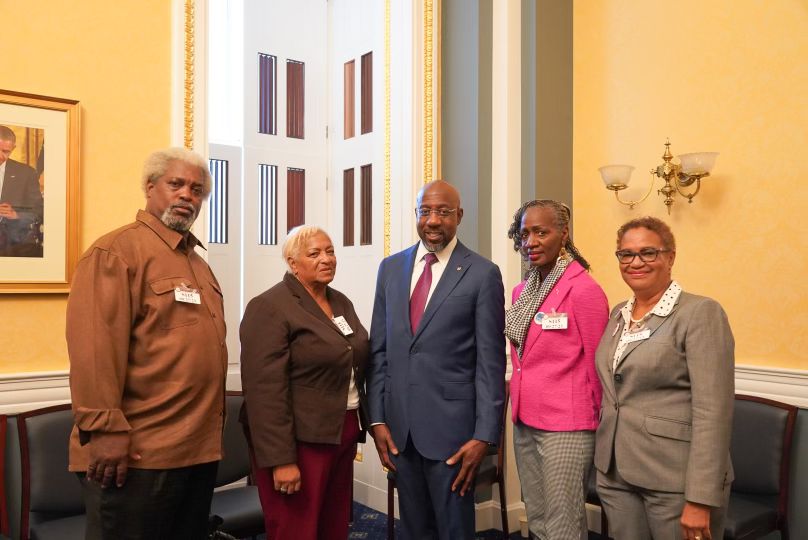The Stop Campus Hazing Act: A Milestone in Hazing PreventionIn recent years, the issue of hazing on college campuses has gained increasing attention due to its harmful and sometimes fatal consequences. Hazing, the practice of subjecting new members of a group to humiliating or dangerous rituals, has plagued educational institutions for far too long. In response to this pressing concern, after years of advocacy by Clery Center, StopHazing, and parent groups, our 118th Congress has taken a significant step towards curbing hazing by designating September 25 – 29 National Hazing Awareness Week (S.Res.360, H.Res.717) and introducing the Stop Campus Hazing Act (S.2901, H.R. 5646). This groundbreaking legislation will require colleges and universities to teach students about the dangers of hazing and hold organizations that engage in this harmful behavior accountable.
Staff from Clery Center and StopHazing, and parents of children who were killed or seriously injured in hazing incidents meeting with Senator Amy Klobuchar, co-lead sponsor of the Stop Campus Hazing Act in Washington DC, September 2023. The Problem of Campus HazingHazing is a deeply entrenched issue, usually disguised as “tradition”, that has affected students for generations. Fraternities, sororities, sports teams, and other campus organizations have often been associated with hazing rituals that range from humiliation to life-threatening activities, sometimes resulting in severe injuries and even fatalities. Over 200 university hazing deaths have occurred since 1838, and since just 2000 there have been more than 50 hazing-related deaths.
The DeVercellys are not alone in their efforts. Many other families who have been affected by hazing incidents have joined the campaign for change over the years, and several of them are with the DeVercellys, Clery Center and StopHazing in Washington, DC, again this week, meeting with legislators to urge them to support the Stop Campus Hazing Act. Their stories serve as a sobering reminder of the urgent need to address this issue comprehensively and effectively.
Clery Center board chair Sheilah Vance (far right) and parents of children who were killed or seriously injured by hazing with U.S. Senator Raphael Warnock (center), September 2023. The Stop Campus Hazing Act: Bipartisan & Evidence-informedThe Stop Campus Hazing Act (Senate Co-Leads: Senators Amy Klobuchar (D-MN) & Bill Cassidy, M.D. (R-LA); House Co-Leads: Representatives Jeff Duncan (R-SC) & Lucy McBath (D-GA)) is a clear, concise, and evidence-informed bill that will amend the Clery Act to require higher education institutions to prevent and respond to hazing. Introduced with bipartisan support, this act includes several key provisions designed to curb hazing and protect students. The Stop Campus Hazing Act will:
Staff from Clery Center, StopHazing, and Safe Campuses LLC, and parents of children who were killed or seriously injured by hazing with U.S. Representative Lucy McBath, July 2022. Harm from hazing is well documented and includes physical injuries, psychological trauma, and even death. Abuse from hazing undercuts positive learning environments and the process of joining a club, team, or organization should not involve abusive situations or traditions, yet hazing continues to occur. The Stop Campus Hazing Act will shift societal norms and structures that enable hazing and encourage institutions to invest resources to address and prevent it. Currently there is no standardized definition of hazing at institutions of higher education and no universal process to track and document hazing incidents. The Stop Campus Hazing Act will provide consumers with current, standardized, and clear information about hazing at any college or university in the United States. A Call for ActionThe Stop Campus Hazing Act is a crucial step towards eradicating hazing on college campuses and ensuring the safety and well-being of students. It empowers students to speak out against hazing, ensures that incidents are properly investigated, and holds individuals and organizations accountable for their actions. In the coming years, it will be essential for colleges, universities, and students alike to work together to implement the provisions of this act effectively. But today, we urge you to please reach out to your legislators to ask them to support this lifesaving bill. StopHazing has created an easy form that takes only minutes to fill out and automatically sends a letter to your local representatives. If you represent an organization, you can complete this form to add your endorsement to the dozens of others who support the Stop Campus Hazing Act. By doing so, we can hope to see a significant reduction in hazing incidents and safer, more inclusive campus communities for all. The Stop Campus Hazing Act is a crucial tool in achieving this important goal, and its passage would be a significant victory for student safety and well-being. |



 The
The 


